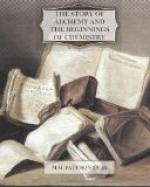To remove the outer wrappings of ordinary properties which present themselves to the untrained senses, was regarded by the alchemists to be a difficult task; to tear away the soul (the class-property) of a substance, and yet retain the Essence which made that substance its dwelling place, was possible only after vast labour, and by the use of the proper agent working under the proper conditions. An exceedingly powerful, delicate, and refined agent was needed; and the mastery of the agent was to be acquired by bitter experience, and, probably, after many disappointments.
“Gold,” an alchemist tells us, “does not easily give up its nature, and will fight for its life; but our agent is strong enough to overcome and kill it, and then it also has the power to restore it to life, and to change the lifeless remains into a new and pure body.”
Thomas Norton, the author of The Ordinal of Alchemy, writing in the 15th century, says the worker in transmutations is often tempted to be in a hurry, or to despair, and he is often deceived. His servants will be either stupid and faithful, or quick-witted and false. He may be robbed of everything when his work is almost finished. The only remedies are infinite patience, a sense of virtue, and sound reason. “In the pursuit of our Art,” he says, “you should take care, from time to time, to unbend your mind from its sterner employments with some convenient recreation.”
The choice of workmen to aid in the mechanical parts of the quest was a great trouble to the alchemists. On this subject Norton says—“If you would be free from all fear over the gross work, follow my counsel, and never engage married men; for they soon give in and pretend they are tired out.... Hire your workmen for certain stipulated wages, and not for longer periods than twenty-four hours at a time. Give them higher wages than they would receive elsewhere, and be prompt and ready in your payments.”
Many accounts are given by alchemical writers of the agent, and many names are bestowed on it. The author of A Brief Guide to the Celestial Ruby speaks thus of the agent—“It is our doorkeeper, our balm, our honey, oil, urine, maydew, mother, egg, secret furnace, oven, true fire, venomous dragon, Theriac, ardent wine, Green Lion, Bird of Hermes, Goose of Hermogenes, two-edged sword in the hand of the Cherub that guards the Tree of Life.... It is our true secret vessel, and the Garden of the Sages in which our sun rises and sets. It is our Royal Mineral, our triumphant vegetable Saturnia, and the magic rod of Hermes, by means of which he assumes any shape he likes.”
Sometimes we are told that the agent is mercury, sometimes that it is gold, but not common mercury or common gold. “Supplement your common mercury with the inward fire which it needs, and you will soon get rid of all superfluous dross.” “The agent is gold, as highly matured as natural and artificial digestion can make it, and a thousand times more perfect than the common metal of that name. Gold, thus exalted, radically penetrates, tinges, and fixes metals.”




